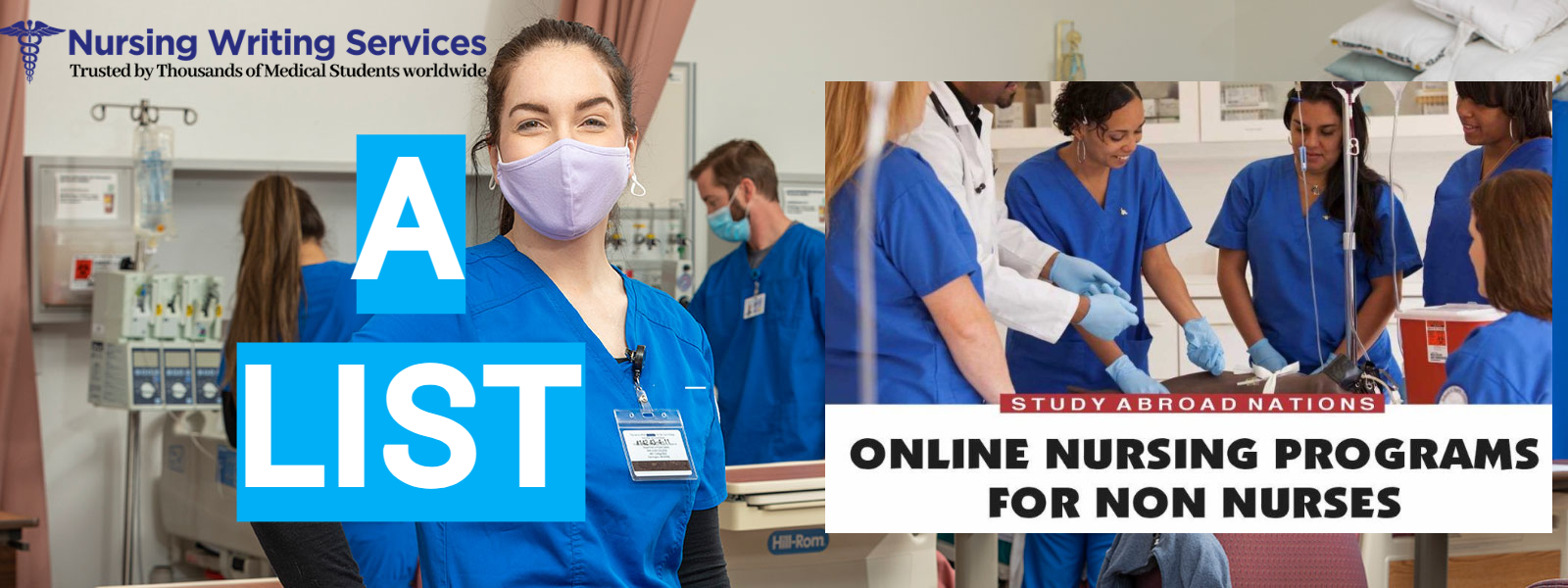
Top Online Programs for Non-Nurses
The field of nursing is rapidly expanding, with increasing demand for qualified professionals. If you're interested in entering the nursing profession but don't have a background in healthcare, an online program may be the perfect choice for you. Here are some of the top online programs for non-nurses, along with details about what each program offers in terms of cost and other important information.
-
Accelerated Bachelor of Science in Nursing (ABSN)
An Accelerated Bachelor of Science in Nursing (ABSN) program is designed for individuals who already have a bachelor's degree in another field. This program allows students to earn their BSN in as little as 12-18 months, as compared to a traditional four-year program.
ABSN programs typically require students to have completed certain prerequisite courses, such as anatomy and physiology, prior to enrolling. The cost of an ABSN program varies depending on the institution, but may be more expensive than traditional nursing programs due to the accelerated timeline.
-
Master of Science in Nursing (MSN)
A Master of Science in Nursing (MSN) program is designed for individuals who have a bachelor's degree in another field and wish to become advanced practice nurses. MSN programs offer a variety of specializations, such as nurse practitioner or nurse anesthetist, and allow students to earn their BSN and MSN degrees simultaneously.
The cost of an MSN program varies depending on the institution and the chosen specialization, but may be more expensive than traditional nursing programs. Additionally, MSN programs typically require students to have prior healthcare experience, such as working as a registered nurse.
-
Direct-Entry Master of Science in Nursing (DEMSN)
A Direct-Entry Master of Science in Nursing (DEMSN) program is designed for individuals who have a bachelor's degree in another field and wish to become advanced practice nurses without first earning a BSN. This program allows students to complete the necessary coursework and clinical hours to become a registered nurse, as well as specialized coursework to become an advanced practice nurse.
The cost of a DEMSN program varies depending on the institution and the chosen specialization, but may be more expensive than traditional nursing programs due to the accelerated timeline and additional coursework required.
-
Entry-Level Doctor of Nursing Practice (DNP)
An Entry-Level Doctor of Nursing Practice (DNP) program is designed for individuals who have a bachelor's degree in another field and wish to become advanced practice nurses with a doctoral degree. This program allows students to complete the necessary coursework and clinical hours to become a registered nurse, as well as specialized coursework to become an advanced practice nurse with a DNP degree.
The cost of an entry-level DNP program varies depending on the institution and the chosen specialization, but may be more expensive than traditional nursing programs due to the advanced degree.
Choosing the Right Program for You
When choosing an online program for non-nurses, it's important to consider your goals and career aspirations. Each program offers unique benefits and challenges, so it's important to research different options and speak with admissions counselors to make an informed decision.
Additionally, it's important to consider the program's accreditation, clinical requirements, and admission requirements when making your decision. Taking these factors into account can help you find the best online program for your needs and goals.
What to Expect in an Online Nursing Program for Non-Nurses
If you're considering an online nursing program for non-nurses, it's important to know what to expect before enrolling. Here are some of the key elements you can expect in an online nursing program for non-nurses:
- Online coursework: As with any online program, coursework will be completed primarily online through a virtual classroom. This may include watching pre-recorded lectures, participating in online discussions, and completing assignments.
- Clinical hours: In addition to coursework, nursing programs also require clinical hours where students gain hands-on experience in a healthcare setting. This may involve working with patients, observing procedures, and assisting with medical tasks under the supervision of a registered nurse or other healthcare professional.
- Proctored exams: Online nursing programs typically require proctored exams to ensure academic integrity. This may involve taking exams in a physical location with a proctor present, or using remote proctoring technology to monitor exams taken online.
- Interactive learning tools: Many online nursing programs utilize interactive learning tools such as virtual simulations, case studies, and other interactive activities to help students gain a deeper understanding of healthcare concepts and skills.
- Support resources: Online nursing programs typically offer support resources to help students succeed. This may include online tutoring, academic advising, and technical support.
- Accreditation: It's important to ensure that the online nursing program you choose is accredited by a reputable organization such as the Commission on Collegiate Nursing Education (CCNE) or the Accreditation Commission for Education in Nursing (ACEN). Accreditation ensures that the program meets national standards for nursing education.
In terms of cost, online nursing programs for non-nurses can range from several thousand dollars to tens of thousands of dollars, depending on the program and institution. It's important to consider the cost of tuition and other expenses, such as textbooks and clinical attire, when budgeting for an online nursing program.
Overall, an online nursing program for non-nurses can offer a flexible and convenient path to entering the nursing profession. By understanding what to expect in terms of coursework, clinical hours, and support resources, you can make an informed decision about which program is right for you.

